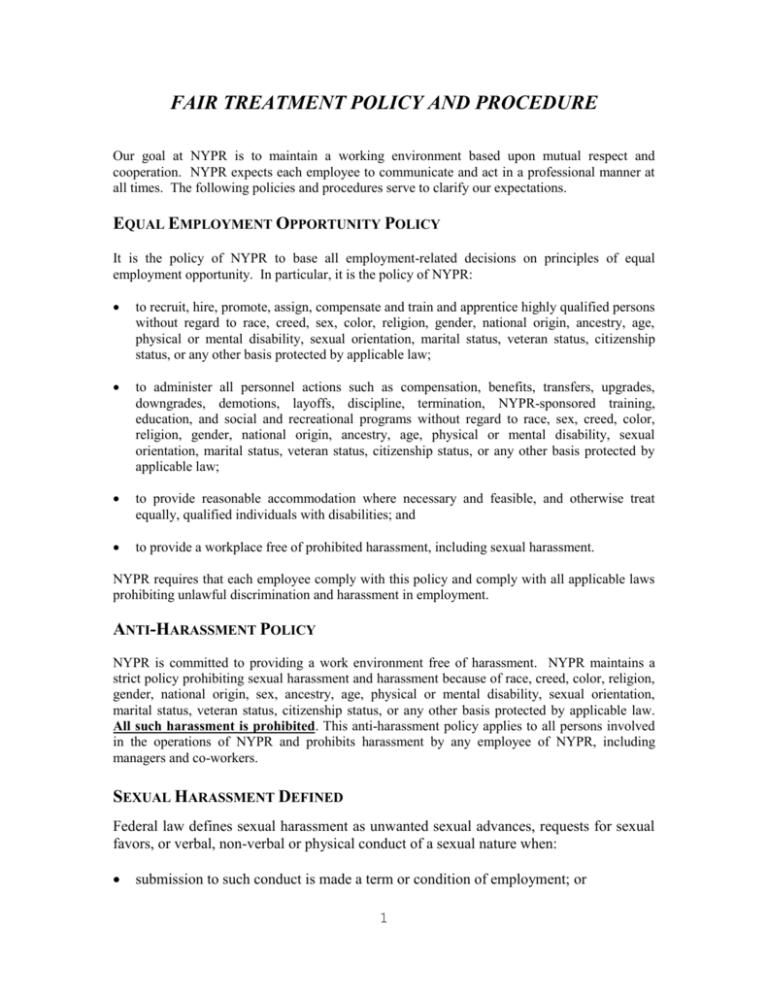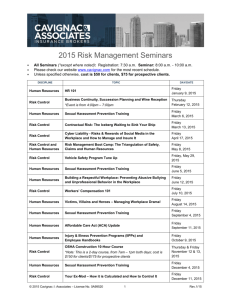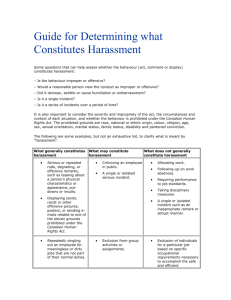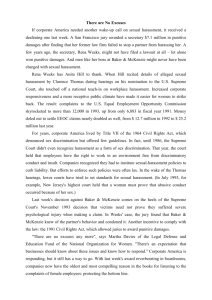
FAIR TREATMENT POLICY AND PROCEDURE
Our goal at NYPR is to maintain a working environment based upon mutual respect and
cooperation. NYPR expects each employee to communicate and act in a professional manner at
all times. The following policies and procedures serve to clarify our expectations.
EQUAL EMPLOYMENT OPPORTUNITY POLICY
It is the policy of NYPR to base all employment-related decisions on principles of equal
employment opportunity. In particular, it is the policy of NYPR:
to recruit, hire, promote, assign, compensate and train and apprentice highly qualified persons
without regard to race, creed, sex, color, religion, gender, national origin, ancestry, age,
physical or mental disability, sexual orientation, marital status, veteran status, citizenship
status, or any other basis protected by applicable law;
to administer all personnel actions such as compensation, benefits, transfers, upgrades,
downgrades, demotions, layoffs, discipline, termination, NYPR-sponsored training,
education, and social and recreational programs without regard to race, sex, creed, color,
religion, gender, national origin, ancestry, age, physical or mental disability, sexual
orientation, marital status, veteran status, citizenship status, or any other basis protected by
applicable law;
to provide reasonable accommodation where necessary and feasible, and otherwise treat
equally, qualified individuals with disabilities; and
to provide a workplace free of prohibited harassment, including sexual harassment.
NYPR requires that each employee comply with this policy and comply with all applicable laws
prohibiting unlawful discrimination and harassment in employment.
ANTI-HARASSMENT POLICY
NYPR is committed to providing a work environment free of harassment. NYPR maintains a
strict policy prohibiting sexual harassment and harassment because of race, creed, color, religion,
gender, national origin, sex, ancestry, age, physical or mental disability, sexual orientation,
marital status, veteran status, citizenship status, or any other basis protected by applicable law.
All such harassment is prohibited. This anti-harassment policy applies to all persons involved
in the operations of NYPR and prohibits harassment by any employee of NYPR, including
managers and co-workers.
SEXUAL HARASSMENT DEFINED
Federal law defines sexual harassment as unwanted sexual advances, requests for sexual
favors, or verbal, non-verbal or physical conduct of a sexual nature when:
submission to such conduct is made a term or condition of employment; or
1
submission to or rejection of such conduct is used as a basis for employment decisions
affecting the individual; or
such conduct has the purpose or effect of unreasonably interfering with an employee’s work
performance or creating an intimidating, hostile or offensive working environment.
Sexual harassment refers to behavior that is not welcome, is personally offensive, fails to respect
the rights of others, lowers morale and, therefore, interferes with our work effectiveness. Sexual
harassment may take different forms and may involve members of the same sex. One specific
form is the demand for sexual favors. Other forms of harassment include, but are not limited to:
Verbal:
Sexual innuendoes, suggestive comments, jokes of a sexual nature, sexual
proposition, or threats of reprisal for making harassment reports.
Non-Verbal:
Dissemination of sexually suggestive objects or pictures, graphic
commentaries, suggestive or insulting sounds, obscene gestures, leering or whistling.
Physical: Unwanted physical contact, touching, pinching, brushing the body, assault or
sexual activity.
OTHER TYPES OF HARASSMENT
Prohibited harassment on the basis of race, creed, sex, color, religion, gender, national origin,
ancestry, age, physical or mental disability, sexual orientation, marital status, veteran status,
citizenship status, or other protected basis includes behavior similar to sexual harassment such as:
Verbal conduct such as threats, epithets, derogatory comments, derogatory jokes or slurs, or
other inappropriate language;
Non-verbal conduct such as derogatory posters, photography, cartoons, drawings or gestures;
Physical conduct such as assault, unwanted touching or blocking normal movement;
Retaliation for making harassment reports or threatening to report harassment.
Whatever form it takes, harassment is insulting and demeaning to the recipient and will not be
tolerated. All employees, managers and non-supervisors alike, must comply with NYPR’s antiharassment policy and take appropriate measures to ensure that such conduct does not occur.
Violations of this policy may result in disciplinary action up to and including termination.
REPORTING AND COMPLAINT PROCEDURE
NYPR’s reporting and complaint procedure provides for a prompt, thorough and objective
investigation of any claim of discriminatory treatment, harassment or retaliation. While not all
teasing, off-hand comments or other isolated conduct constitutes prohibited harassment, if NYPR
determines that prohibited discrimination or harassment has occurred, NYPR will take
appropriate remedial action against a person found to have engaged in prohibited discriminatory
or harassing behavior. The discipline will be commensurate with the severity of the offense, up
to and including termination. Appropriate action will also be taken to deter any future prohibited
behavior.
2
Employees who believe they have been the subject of discrimination or harassment of
any type should immediately report the matter to their immediate supervisor and/or
Director or the Director of Human Resources. If any further incident(s) of discrimination
or harassment occur, the incident(s) should be immediately reported.
Employees who witness or otherwise become aware of discrimination or harassment by
or against any other employee should immediately report that information to their
immediate supervisor and/or Director or the Director of Human Resources.
All reported incidents of discrimination and/or harassment will be promptly investigated. NYPR
will, to the extent feasible, maintain the confidentiality of such complaints. However,
investigation of such complaints will generally require disclosure to the accused party and other
witnesses in order to gather pertinent facts. When the investigation is complete, a determination
regarding the allegations will be made and information will be communicated to the person
claiming discrimination and/or harassment as soon as practical. NYPR will also take such action
as it believes is appropriate under the circumstances, including, but not limited to, training,
referral to counseling, warning, reassignment, compensation adjustment or termination.
Any knowingly false or malicious complaints of discrimination or harassment will also result in
appropriate disciplinary action, up to and including termination.
NO RETALIATION
NYPR strictly prohibits retaliation against any person by another employee or by anyone
representing NYPR for using NYPR’s Reporting and Complaint Procedure, for reporting
discrimination or harassment, or for filing, testifying, assisting or participating in any manner in
any investigation, proceeding or hearing conducted by a governmental enforcement agency.
Prohibited retaliation includes, but is not limited to, termination, demotion, suspension, failure to
hire or consider for hire, failure to give equal consideration in making employment decisions,
failure to make employment recommendations impartially, adversely affecting working
conditions or otherwise denying any employment benefit.
Any person who feels that s/he has experienced such prohibited retaliation, or who is aware of
any prohibited retaliation by any person, should immediately report the matter by following the
Reporting and Complaint Procedure above. As with complaints of discrimination or harassment,
NYPR will immediately investigate any complaint and will take appropriate action to prevent or
rectify any retaliation.
3






